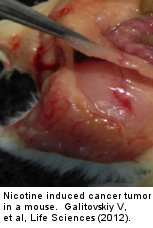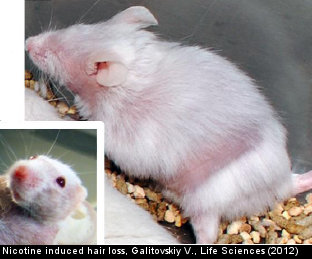
Study Claims Nicotine Causes Cancer
Injecting mice for two years with levels of nicotine sufficient
to cause hair loss caused 78 percent to develop cancer.
 Does nicotine cause cancer? As if those addicted to nicotine really need another reason to quit, authors of a new study of mice claim that nicotine is in fact a carcinogen.
Does nicotine cause cancer? As if those addicted to nicotine really need another reason to quit, authors of a new study of mice claim that nicotine is in fact a carcinogen.
"We demonstrated for the first time that chronic treatment of A/J mice with an LD50 dose of nicotine cause carcinogenic transformation of both smooth and striated muscles as well as transient hair loss," wrote University of California Ervine researchers in their new study published online at Life Sciences.[1]
"Our results, therefore, should add nicotine to the list of potential carcinogens present in tobacco products and raise concern about the safety of long term usage of nicotine replacement products."
Fifteen mice were injected with 3 milligrams of nicotine per kilogram of body weight, 5 days per week for 24 months. Five other mice served as controls and were injected with saline.
One mouse died of nicotine toxicity before treatment was complete. Eleven of the surviving 14 nicotine treated mice developed cancer tumors originating in either the uterus or skeletal muscle. None of the control mice developed tumors.
But Professor Andre Castonguay of the University of Laval in Quebec isn't convinced. Professor Castonguay notes that the nicotine molecule's chemical structure doesn't suggest a carcinogen, there were no lung tumors as would be expected, and two of the chemicals nicotine breaks down into (its metabolities) are already known to cause cancer, NNN and NNK.
"Even if nicotine was nitrosated in vivo to NNN and NNK, one could not say that nicotine is carcinogenic. Nicotine would be a precursor to a carcinogenic metabolite or a procarcinogen," asserts Professor Castonguay.
"Previous studies have suggested that nicotine would be a promoter or enhancer of tumor development. The chemical structure of nicotine would be more consistent with this activity than with a carcinogenic activity."
 Researchers in the study also noticed that nicotine treated mice started losing hair after 8-9 months of treatment. The number of hair follicles in affected areas declined by an average of roughly 30 percent.
Researchers in the study also noticed that nicotine treated mice started losing hair after 8-9 months of treatment. The number of hair follicles in affected areas declined by an average of roughly 30 percent.
Online, long-term nicotine gum chewers, both male and female, have long complained of significant hair loss.[2] Is hair loss reversible once nicotine use ends? "It regrew in our experimental mice," states Professor Sergei A. Grando, a physician and the study's senior author.
Like the caged canary in the mineshaft, might hair loss be a warning sign that blood nicotine levels are dangerously high? "Maybe," says Dr. Grando.
And what advice would Dr. Grando give to those hooked on smoked nicotine, smokeless nicotine, replacement nicotine or e-cigarette nicotine? "I had smoked for 25 years and then quit cold turkey. It is possible!"
References:
[1] Galitovskiy Valentin, Chernyavsky Alexander I., Edwards Robert A., Grando Sergei A., Muscle sarcomas and alopecia in A/J mice chronically treated with nicotine, Life Sciences (April 2012), doi: 10.1016/j.lfs.2012.03.041
[2] Polito JR Long-term Nicorette gum users losing hair and teeth, WhyQuit, December 1, 2008
Related Nicotine Cancer Reading
- Shen J, Xu L, Owonikoko TK, Sun SY, Khuri FR, Curran WJ, Deng X, NNK promotes migration and invasion of lung cancer cells through activation of c-Src/PKCι/FAK loop, Cancer Letters, May 1, 2012;Volume 318(1), Pages 106-113.
- Nordenvall C, Nilsson PJ, Ye W, Andersson TM, Nyrén O, Tobacco use and cancer survival: A cohort study of 40,230 Swedish male construction workers with incident cancer, International Journal of Cancer, April 11, 2012 doi: 10.1002/ijc.27587.
- Warren GW, Romano MA, Kudrimoti MR, Randall ME, McGarry RC, Singh AK, Rangnekar VM, Nicotinic modulation of therapeutic response in vitro and in vivo, International Journal of Cancer, March 24, 2012, doi: 10.1002/ijc.27556.
- Nishioka T, Kim HS, Luo LY, Huang Y, Guo J, Chen CY, Sensitization of epithelial growth factor receptors by nicotine exposure to promote breast cancer cell growth, Breast Cancer Research, November 15, 2011, 13(6):R113.
- Cardinale A, Nastrucci C, Cesario A, Russo P, Nicotine: specific role in angiogenesis, proliferation and apoptosis, Critical Reviews in Toxicology, 2012 Jan;42(1):68-89. Epub 2011 Nov 4.
- Nishioka T, Yamamoto D, Zhu T, Guo J, Kim SH, Chen CY, Nicotine overrides DNA damage-induced G1/S restriction in lung cells, PLoS One. April 29, 2011, 6(4):e18619.
- Clark CA, McEachern MD, Shah SH, Rong Y, Rong X, Smelley CL, Caldito GC, Abreo FW, Nathan CO, Curcumin inhibits carcinogen and nicotine-induced Mammalian target of rapamycin pathway activation in head and neck squamous cell carcinoma, Cancer Prevention Research (Phila). 2010 Dec;3(12):1586-95. Epub 2010 Sep 17.
- Lazar M, Sullivan J, Chipitsyna G, Gong Q, Ng CY, Salem AF, Aziz T, Witkiewicz A, Denhardt DT, Yeo CJ, Arafat HA, Involvement of osteopontin in the matrix-degrading and proangiogenic changes mediated by nicotine in pancreatic cancer cells, Journal of Gastrointestional Surgery, 2010 Oct;14(10):1566-77. Epub 2010 Sep 8.
- Puliyappadamba VT, Cheriyan VT, Thulasidasan AK, Bava SV, Vinod BS, Prabhu PR, Varghese R, Bevin A, Venugopal S, Anto RJ, Nicotine-induced survival signaling in lung cancer cells is dependent on their p53 status while its down-regulation by curcumin is independent, Molecular Cancer. 2010 Aug 20;9:220.
- Shen T, Le W, Yee A, Kamdar O, Hwang PH, Upadhyay D, Nicotine induces resistance to chemotherapy in nasal epithelial cancer, American Journal of Rhinology and Allergy. 2010 Mar-Apr;24(2):e73-7.
- Davis R, Rizwani W, Banerjee S, Kovacs M, Haura E, Coppola D, Chellappan S.Nicotine promotes tumor growth and metastasis in mouse models of lung cancer, PLoS One, October 20, 2009;4(10):e7524. [link to free copy of this study: https://www.ncbi.nlm.nih.gov/pmc/articles/PMC2759510/ ]
- Stepanov I, Carmella SG, Briggs A, Hertsgaard L, Lindgren B, Hatsukami D, Hecht SS., Presence of the Carcinogen N'-Nitrosonornicotine in the Urine of Some Users of Oral Nicotine Replacement Therapy Products, Cancer Research, October 20, 2009 [Epub ahead of print] [Link to free study supplementary data - Tables 1-3
- Polito JR Nicorette, Commit lozenge and NicoDerm CQ cancer scares, WhyQuit, October 28, 2009
- Sun X, Ritzenthaler JD, Zhong X, Zheng Y, Roman J, Han S. Nicotine stimulates PPARbeta/delta expression in human lung carcinoma cells through activation of PI3K/mTOR and suppression of AP-2alpha, Cancer Research, August 15, 2009, Volume 69(16), Pages 6445-6453. Epub August 4, 2009.
- National Toxicology Program, Substance Profiles: N-Nitrosonornicotine CAS No. 16543-55-8, Report on Carcinogens, Eleventh Edition, January 2005
- Polito JR Patrick Swayze's doctor's smoking advice may hasten death, WhyQuit, September 22, 2009
- Polito JR Long-term Nicorette gum users losing hair and teeth, WhyQuit, December 1, 2008
